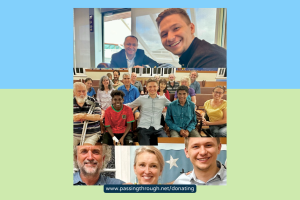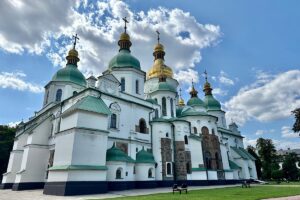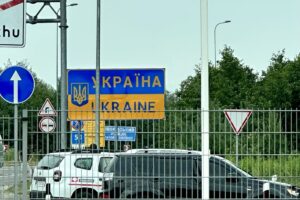Bringing ‘Under Black Banners’ to Life: The Journey of a Lost Manuscript
In the 1960s, my grandfather, Nikodym Pliczkowsky*, began writing what would become his life’s work—a 1,600-page book, “Under Black Banners – Feodosiy Shchus and the long fight for Ukrainian freedom” recounting the Ukrainian Revolution through the lens of personal experiences and family connections. The manuscript, named after Feodosiy Shchus, a cousin by marriage and insurgent leader, was more than a novel—it was an eyewitness account of Ukraine’s fight for freedom, filled with battle stories, humour, and deeply personal memories. After decades of being hidden and thought lost, this story has finally come to light. But through a series of fortunate discoveries and technological advancements, my grandfather’s work will soon be published. This is the journey of how ‘Under Black Banners’ came to life.
The Origins: A Childhood Steeped in Revolution
In his early years, my grandfather lived through a tumultuous time in Ukraine’s history. His village was home to insurgent leader Feodosiy Shchus, who fought alongside the anarchist Nestor Makhno against both Bolsheviks and Whites in the fight for Ukrainian independence. Shchus was not only a revolutionary figure but also my grandfather’s cousin by marriage.
My grandfather spent much of his childhood with his older sister, Evdokia, a teacher and head of the local Prosvita, a Ukrainian cultural organisation. Feodosiy Shchus would often visit Evdokia to recount his battle stories, and my grandfather, a young boy at the time, would listen in awe as he shared tales of insurgency, victories, and losses. These memories of sitting at the kitchen table, overhearing Shchus’s conversations, would form the core of the book my grandfather began writing in the 1960s, along with meticulous research and documents provided by others.
A Childhood Rooted in Ukrainian Identity
Growing up, I was incredibly close to my grandfather, whom I called “Dyeda” (a child’s pronunciation of the Ukrainian word for grandfather). My mother worked, and my father was a medical student, so my grandfather was the primary figure in my early life before my sister was born. He raised me with a deep connection to my Ukrainian roots. My first words were in Ukrainian, and even though I later lost fluency in the language, I never lost the sense of identity that he instilled in me. If I fell and scraped my knee, he’d tell me, “Get up, don’t cry—
you’re a Cossack girl!” Of course, if I did cry, he would scoop me up in his arms and offer a comforting hug.
My grandfather filled his home with symbols of Ukraine, including the banned ‘tryzub’, the now national emblem of Ukraine, which was illegal in Soviet-occupied Ukraine but proudly displayed in his office. I grew up hearing about Ukraine’s poets, freedom fighters, and the horrors of the Holodomor—a forced famine that killed millions of Ukrainians. My identity was deeply tied to the stories he shared. Most of all, I heard stories about Feodosiy Shchus and his role in the fight for independence, which captured my imagination and fuelled my curiosity.
The Manuscript: A Lost Treasure
In the late 1980s, after my grandmother passed away, my grandfather moved to Brisbane to live with me while I was attending university. We lived together in a small house, growing vegetables and watermelons in the backyard like ‘good Ukrainians’ and continuing the tradition of family storytelling. During those years, I watched my grandfather at the kitchen table, typing on his old manual Ukrainian typewriter, as he finished his novel—a book he had been working on for decades. In 1991, just as Ukraine declared its independence, my grandfather completed his book. This was a moment of great pride for him.
Sadly, on 24 August 1992—exactly one year after Ukraine’s independence—my grandfather passed away. My grandfather had saved what was then a significant sum of money to publish the book. However, publishing in the early 90s was a far more complicated and expensive process than it is today. My father had a contact through a Christian ministry who seemed trustworthy, who offered to print the book cheaply in what was then the USSR after my grandfather had passed away. This man, a Russian, took the manuscript and the money and disappeared. The book was gone, and I believed it was lost forever.
The Miraculous Rediscovery
Years later, during one of my mother’s several house moves that I helped with, my husband was helping clean out her shed. He found many old, unopened boxes that were ruined by moisture and rat nests. Many of the boxes had been untouched for decades, filled with childhood items, family papers, and documents from my grandfather. My husband was helping her clean out her shed. My heart skipped a beat when we found a box with an envelope addressed to “Dearest Nuchka” (granddaughter in Ukrainian) and “Lalichka” (my nickname). Inside the box was something extraordinary—a second, hand-typed copy of his book, yellowed with age but intact.
I couldn’t believe it. My grandfather had painstakingly hand-typed a second copy of the 1,600-page manuscript. This was an incredible discovery—a piece of family history I thought was lost forever had suddenly reappeared. Now, with technology more advanced than when my grandfather was alive, I was determined to preserve his work and make sure it was shared with the world.
The Journey of Rediscovery and Technology’s Role
As time moved on, technology offered new possibilities. I thought, perhaps, now I could finally preserve the manuscript electronically. I bought a special scanner, one designed for delicate pages, and set to work, scanning each of the 1,600 pages of my grandfather’s manuscript one by one. It was slow, careful work, but I was hopeful that with the advancements in OCR (Optical Character Recognition) technology, I could transform the manuscript into a usable digital text.
However, my heart sank when I saw the results. The text, typed on my grandfather’s old manual typewriter, was filled with crossouts, corrections, and handwritten notes. These made it almost impossible for OCR software to accurately recognise the words. I was left with a PDF version for safekeeping, but nothing more. After trying various programs, each with the same disappointing result, I realised that this path wasn’t going to work.
At that point, I considered paying someone to manually transcribe or translate the entire manuscript. But when I researched freelance services, the costs were astronomical, even from overseas. The cheapest quotes were still far beyond my reach.
During this time, technology was advancing rapidly. Google Translate had come into play, and I wondered if it could be the key to unlocking my grandfather’s manuscript. However, I quickly hit a roadblock: without an electronic text version, Google Translate couldn’t be of much help. That’s when my dad suggested an idea—what if we found someone in Ukraine who could transcribe the scanned pages into a Word document? Once in a digital format, the Ukrainian text could then be run through Google Translate for easier translation.
I thought it was a good idea, and just as I began looking into options, Russia launched a full-scale invasion of Ukraine on 24 February 2022. Amidst the ensuing refugee crisis, I came across a Facebook post from a woman in Poland who had taken in a Ukrainian refugee. She was asking if anyone had remote work for her guest, a woman named Anna, to help support her while she was displaced.
This serendipitous moment led to a connection with Anna, who was from Kyiv. Over many months, Anna and I worked together. I sent her scanned pages of the manuscript, and she transcribed them into a Word document. It was an emotional process for both of us. For me, seeing the words my grandfather had typed decades earlier finally come to life in a format I could work with was overwhelming. For Anna, it was a way to connect with her heritage while displaced by war.
Once I had the transcribed Ukrainian text, I began running it through Google Translate. At first, the sight of the words unfolding in English was exciting—it was the first time I had been able to read my grandfather’s work. However, it soon became clear that Google Translate wasn’t going to be the easy solution I had hoped for. There were character limits, meaning processing 1,600 pages would take an enormous amount of time. Worse, the translations were crude, often requiring hours of work on each page to correct the grammar, research word meanings, and ensure the context was accurate.
On top of that, many terms didn’t translate correctly. I had to spend a great deal of time investigating historical references, local slang, and cultural nuances to make sense of the text. Additionally, many Ukrainian place names had changed over the years, so I needed to research their modern equivalents and add footnotes to ensure today’s readers would understand the geography and history.
As time went on, AI technology continued to improve. I was one of the early users of ChatGPT and immediately saw its potential to assist with the translation process. It was far more advanced than Google Translate, and as I reprocessed much of the manuscript through this new tool, the translations improved dramatically. Yet, it wasn’t perfect. Each page still required significant manual editing, checking for accuracy, and rewriting sections to ensure the narrative flowed properly. On multiple occasions, I discovered missing sections and had to go back to the scanned pages to locate them, a task made even more challenging by my limited knowledge of Ukrainian.
By this time, I had been teaching myself more Ukrainian, which helped immensely with placing sections and correcting the text in the Ukrainian version. Eventually, I paid someone to do a final edit of the Ukrainian version and I added the footnotes to ensure that the manuscript would be as accurate and informative as possible.
During this process, I followed the book’s descriptions of place names and locations on Google Maps and Google Search. Often, the first results that appeared were news articles—villages my grandfather wrote about were once again being occupied, bombed, or liberated as Ukraine fought off the Russian invasion in real time. This eerie connection between the book’s century-old setting and current events was a strange and emotional experience. It became clear to me that this book, written decades ago, was more important and timely than ever. My grandfather had intended it as a way for Ukrainians to learn from their past, and now it would be released at a moment when the lessons of history were needed most.
 A Legacy for the Future
A Legacy for the Future
The journey to get ‘Under Black Banners’ published has been long, hard, costly and often frustrating but also with moments of joy and discovery.
This is not just a family story; it’s a testament to the resilience of the Ukrainian people, a reminder that their fight for freedom stretches back generations.
As Ukraine continues to fight for its freedom, I feel a sense of urgency to see this book in print. Now, in October 2024, two and a half years after Russia’s invasion, and several years since I began this project, it is nearly ready for publication. I plan to channel all the proceeds from the book to aid Ukraine in its current fight for survival. I know that would have meant everything to my grandfather, and that my grandfather would be proud to see his work finally reach the world, and even prouder to know that its proceeds will support the very cause he spent his life fighting for. I cannot think of a better way to honour his memory.
Sign up HERE to be the first to know when
‘Under Black Banners’ is
available for purchase!
And please share and spread the word!
- My grandfather’s name is originally in Cyrillic alphabet which means there are various interpretations of the English spelling. His name appears on the internet as Nikodym Pliczkowsky, Nicodemus Plichkovski, Nykodym Plichkovskyi, and Nichodem Pliczkowski amongst others. In fact that is not his real name as he had to change it and forge papers to avoid deportation back to the USSR and certain death or a gulag under Stalin and instead was able to immigrate to Australia.















Love to hear your comments!